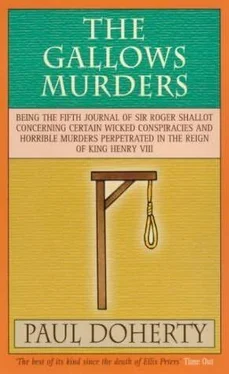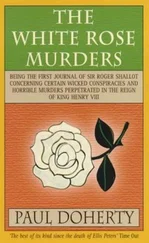Paul Doherty - The Gallows Murders
Здесь есть возможность читать онлайн «Paul Doherty - The Gallows Murders» весь текст электронной книги совершенно бесплатно (целиком полную версию без сокращений). В некоторых случаях можно слушать аудио, скачать через торрент в формате fb2 и присутствует краткое содержание. Жанр: Исторический детектив, на английском языке. Описание произведения, (предисловие) а так же отзывы посетителей доступны на портале библиотеки ЛибКат.
- Название:The Gallows Murders
- Автор:
- Жанр:
- Год:неизвестен
- ISBN:нет данных
- Рейтинг книги:4 / 5. Голосов: 1
-
Избранное:Добавить в избранное
- Отзывы:
-
Ваша оценка:
- 80
- 1
- 2
- 3
- 4
- 5
The Gallows Murders: краткое содержание, описание и аннотация
Предлагаем к чтению аннотацию, описание, краткое содержание или предисловие (зависит от того, что написал сам автор книги «The Gallows Murders»). Если вы не нашли необходимую информацию о книге — напишите в комментариях, мы постараемся отыскать её.
The Gallows Murders — читать онлайн бесплатно полную книгу (весь текст) целиком
Ниже представлен текст книги, разбитый по страницам. Система сохранения места последней прочитанной страницы, позволяет с удобством читать онлайн бесплатно книгу «The Gallows Murders», без необходимости каждый раз заново искать на чём Вы остановились. Поставьте закладку, и сможете в любой момент перейти на страницу, на которой закончили чтение.
Интервал:
Закладка:
I gazed at the lonely gibbet. 'Hellbane,' I said. 'What sort of name is that?'
The city executioners are a rare breed.' Benjamin explained. 'Surprisingly, Roger, despite all the barbarism, very few people want their job. They are marked men, hated and reviled by London's underworld. However, they do a job that has to be done, and business is always brisk.'
(Oh, God bless my master for his truthful heart. During the Great Beast's reign the scaffold and gibbets were never empty. I know of one executioner, an axeman, who became so sickened by the dreadful sentences he had to carry out that he became quite mad and tried to cut his own head off. Poor fellow, he died in chains in Bedlam.)
'Anyway,' Benjamin continued, 'the city hangmen are patronised by the King himself.' 'Like is always attracted to like,' I remarked.
They meet in a tavern called the Gallows, in the shadow of the Tower. They have their own guild. They wear a chain round their wrists and hold meetings in the nave of St Peter ad Vincula.'
(Now, there's a dreadful place. Under St Peter ad Vincula, the Tower chapel, lies the headless corpses of all Henry's victims; all those who died on the execution block or perished in some desolate dungeon.) 'So,' I insisted. Two hangmen have been murdered. They are not the most popular of men.'
'Somehow,' Benjamin replied, 'My Lord Cardinal believes the murders of these two hangmen and the blackmail letters to the King are connected.' He paused as the boat swung in towards the quayside. 'You see, Roger, no one really knows what happened to the Princes in the Tower. They might have been poisoned, strangled or starved.'
The Cardinal,' Agrippa explained, has studied the fate of these princes closely. He has also spoken to Sir Thomas More who is writing a study of King Richard the Third's life. Now More believes that the Guild of Hangmen must have known what happened to the two Princes.'
‘You mean a secret passed on from one generation to another?' I asked.
'Precisely,' Benjamin replied. 'John Mallow, the chief hangman, has sworn a great oath that no such secret exists, but, "dearest Uncle" is not convinced. He believes that if the Princes were killed and their bodies removed, someone from the Guild of Hangmen must have been involved.' 'But this is just dearest Uncle's feeling?' I asked.
Benjamin sighed and put his hands together. 'Well, if this villain writing the blackmailing letters is a charlatan, the only way the King could silence him, or so dearest Uncle reasons, is by finding out what really happened to the Princes and proclaiming this to the city and the kingdom. Henry would give his eye-teeth just to find their corpses.'
'And so this same charlatan,' I added, 'is murdering the hangmen just in case one of them has inherited the secret and could reveal the truth?'
'Exactly,' Benjamin replied, peering over his shoulder at the approaching quayside. 'And how many are in the Guild of Hangmen?' I asked. There should be seven,' Benjamin replied. 'John Mallow, he's old and about to retire. Andrew Undershaft, lately deceased. Hellbane, who's also been called to his maker, and four other assistants: Snakeroot, Horehound, Toadflax and Wormwood. And, before you ask your question, Roger, the chief hangman's apprentices are never called by their real names.' He smiled thinly. This is to protect them; sometimes they change their minds and decide to take up another profession.'
I looked up at the jutting towers and turrets of the Tower. 'If I had my way, Master,' I grumbled, 'I'd do the same.'
Chapter 4
How can I describe the Tower? A narrow, cruel place. Yet, in 1523, it had yet to acquire its reputation as the Great Beast's slaughter ground. Oh, Edmund Stafford, Duke of Buckingham, had lost his head on the hill outside, but to me it was still a double shield of walls beyond a wide moat; a fortress, strengthened by at least a dozen towers which ringed the great Norman keep that dominated all. It stored the King's arms and artillery, his jewel house, his mint as well as his menagerie, with its lions, apes, pelicans, elephants, bears and other unfortunate animals, sent as gifts by foreign princes. When we approached it after leaving Charterhouse, my overriding concern was about the stench from the moat slimed with green, and the occasional corpse of some animal bobbing on the surface. We entered by the Lion Gate, passing guards who snapped to attention as Agrippa showed his warrant carrying the King's personal seal.
The Tower is like a maze. It draws you in: you become lost, as well as over-awed, by the winding paths along high brick walls, the tower doors, closely guarded, the shutters on the windows firmly bolted. Then, as in a maze, you reach the centre, a great, open, green expanse surrounding the Norman keep: the playground of children of the Tower garrison, who hopped and jumped amongst the mangonels, catapults and other impedimenta of war. Soldiers' wives had put up lines to dry their clothes, whilst the men lazed in the shadows, drinking, dicing, sleeping or gossiping. A homely scene – and that's part of the trap. Around the green are entrances to the different towers. Each of them contains its own mysteries: twisting, mildewed steps which stretch up to cells, or worse, go down to the cavernous pits where the torturers with their instruments wait to search out the truth.
In one far corner, just near the church of St Peter ad Vincula, is a stretch of ground where the grass struggles to grow. Some say it's cursed because that's where the scaffold's erected. I believe this. In my long and troubled life I came to know the Tower well. Sometimes as a visitor, other times as a guest of the King, his prisoner. I have been stretched out on Exeter's Daughter, the great rack which pulls your limbs from their sockets. If you survive and confess, the executioners fix steel plates so your body is in one piece when they cart it out for execution. However, I babble on. On that fine August day, with the sun beaming down, I had no knowledge of the Tower's future. Believe me, if I had, I would have turned and run like a whippet for the nearest gate.
Now, across the green, facing the Norman tower, are the royal apartments, housed in a long, ramshackle building, three storeys high, with a red slated roof, cornices, buttresses and jutting bay windows. A manor house, with black timber and white plaster walls on a red brick foundation. These were the royal quarters where the King's officers lodged.
We went through a bustling entrance and up a broad, sweeping staircase. A guard at the top took our names. He told us to wait on a bench in a small recess, marched down the gallery and knocked at the door. I heard a bell ring, and the guard beckoned at us to approach. We entered a chamber where three men were hurriedly seating themselves around a long, polished table which ran down the centre of the room. They rose as we entered. The man at the top introduced himself as Sir Edward Kemble: fussy, grey-haired, grey-eyed, grey-faced. He was dressed richly in a dark-blue gown lined with dyed black lambswool: however, the jerkin beneath was rather soiled, and the shirt collar which peeped out above looked as if it had missed wash-day. Kemble was one of those worried officials, narrow-eyed from peering over manuscripts. He had an unhealthy pallor and hands which could never stay still. He introduced the gentleman on his right as Master Francis Vetch, his lieutenant or deputy, a bright-faced young man with close-cropped black hair, wide-spaced blue eyes and a pleasant smiling mouth. Vetch was dressed soberly in a dark yellow gown which fell just below the knee. A warbelt was strapped round his middle, but he'd left his sword and dagger lying on a stool just within the door. The man on Kemble's left was Reginald Spurge: a frightened squirrel of a man, with nostrils like a horse, ever sniffing the wind, little darting eyes, and a tongue which reminded me of a cat's, pink and pointed, ever licking dry lips. Like Vetch and Sir Edward, he was clean-shaven. (The King had yet to grow his beard. Of course, what the King did, everyone hurriedly followed suit.)
Читать дальшеИнтервал:
Закладка:
Похожие книги на «The Gallows Murders»
Представляем Вашему вниманию похожие книги на «The Gallows Murders» списком для выбора. Мы отобрали схожую по названию и смыслу литературу в надежде предоставить читателям больше вариантов отыскать новые, интересные, ещё непрочитанные произведения.
Обсуждение, отзывы о книге «The Gallows Murders» и просто собственные мнения читателей. Оставьте ваши комментарии, напишите, что Вы думаете о произведении, его смысле или главных героях. Укажите что конкретно понравилось, а что нет, и почему Вы так считаете.












